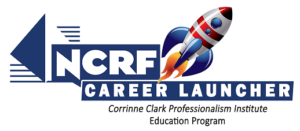Ask any working court reporter or current court reporting student, and they’ll agree that completing court reporting school takes dedication, determination, focus, and lots of support from family, friends, and mentors. It is a tough road indeed and more commonly than not, many find that completing a court reporting program within two years is often one of the greatest challenges of making into the ranks of working reporters.
At Clark State Community College in Springfield, Ohio, however, Cassandra Hall and Heather Piper have successfully completed the required course work in the court reporting program in 18 months and are now in the midst of their required internships. Both of the women have very different stories about how they chose court reporting as a career and what keeps them focused on the end goal.
According to Robyn M. Hennigan, RPR, CRI, assistant professor and program coordinator of the court reporting program at CSCC, Hall and Piper have proven to be outstanding students and excellent examples of what it takes to succeed.
“Cassandra is a phenomenal student who is hardworking and dedicated to her studies. She balances being a single mother with being a full-time realtime court reporting student and does it with eloquence,” said Hennigan, who has been a full-time instructor for 13 years.
“Heather is also an outstanding student, completing required work early or on time; and she is always looking for ways to improve. She has juggled employment along with being a full-time student to accomplish her goal of becoming a court reporter,” Hennigan noted.
Both Hall and Piper shared the following insights into what it has taken each of them to successfully complete their educations as well as where they plan to take their careers when they officially enter the workforce. Read their profiles below.
Cassandra Hall, Xenia, Ohio
What attracted you to the court reporting profession?
It was actually my mother who introduced me to court reporting. She works at Clark State and has been acquainted with one of the court reporting instructors. She thought it would be something I could do well and enjoy. She tried to interest me in the program several years back, but the timing wasn’t right. Once my son was born in the spring of 2013, I decided it was time for me to get my act together and start the program. It was one of the best decisions I’ve ever made. Once I began to understand more about the profession, I was hooked. The more I learn, the more I love what I’m training to do. This is a career that puts me completely in control of my future and success, and I plan to take full advantage of it.
How long did you anticipate it would take you to finish the program and graduate?
It was always my goal to stay on track with the number of courses the program recommended for each term in order to finish in roughly two years. I was very fortunate that I didn’t have to juggle a job and school at the same time while raising my son as a single parent. My parents were incredibly supportive of my decision to start this program. They really bent over backwards to give me any help I needed with my son until I was able to arrange part-time day care. That allowed me to take the required number of courses each term in order to stay on track with the projected completion of the program.
Finishing the classroom part of the program in 18 months is considered a quick time. What do you attribute your success in achieving this to?
There really isn’t one thing that I would consider the sole attribute to my success so far. There were so many factors that contributed each step of the way. One of the most important factors, though, was the incredible support system nurtured by the instructors and fellow classmates. It’s such a small program that we all became a little family, in a way. There were two out-of-state students who started the program when I did, and I’ve had text, email, and discussion-post conversations with the student from Alaska. She and I would bounce ideas off of each other and share struggle strokes and briefs, time zones notwithstanding. Robyn Hennigan has told me that she claims me as her own, adding, affectionately, “whether you like it or not.” I don’t know if she’s aware of just how much that means to me. I’ve been a student before, and I’ve taken online classes before; but I’ve never been in a program that is so committed to each individual student. The instructors always give detailed and specific feedback, taking time to see the things I’m struggling with and offering strategies to overcome them. There were several occasions when my only opportunity to complete and submit assignments was three or four days before the deadline, and I never expected to see the grades until after the due date. More often than not, Allison Kimmel, RDR, CRR, CBC, CCP, and adjunct instructor, responded with in-depth feedback within the hour. In my experience as a student in this program, I’ve never, ever felt that I was put on the back burner, even though the instructors, in addition to teaching, are actively working in the field. I think the fact that students are capable of completing the classroom part of the program in 18 months is testimony to the instructors and their devotion to the students’ success. Also, aside from waiting tables again or flipping burgers, I had nothing to fall back on if I didn’t complete this program as quickly and efficiently as possible. With my future and my son’s well-being on the line, the idea of taking a semester off or giving up just wasn’t an option.
How long will your internships run? Do you have them set up already?
The time frame for the internships will be the duration of the summer term, from May 26 to July 31. I’ll need to complete a total of 80 writing hours — 40 hours in both official and freelance reporting. I have been in contact with Paula Blosser, RPR; Sue Terry, RPR, CRR; Tracy Coleman, RMR, CRR; and Leigh Ann Capizzi, RMR. I am scheduled to begin my official intern experience with Coleman during the first week of June, while tentative plans have been made with the other reporters.
Once you graduate, what area of the court reporting field do you plan to go into and why?
I plan on beginning my career as a freelance reporter. One of the many aspects that attracted me to court reporting was the opportunity to do this job virtually anywhere in the country. I’ve always suspected that I have gypsy in my blood, and freelancing will give me the ability to relocate when it’s time to move on to the next place. I will likely work locally for the first year or two after certification, but I’m eager to experience another part of the country and expose my son to different cultures, languages, traditions, and lifestyles. I have also strongly considered working for an international freelance agency to expand upon those experiences for myself and for my son, especially as he gets older. Eventually, I may choose to settle down and become an official reporter somewhere, but only time will tell.
How soon do you plan to test for your RPR certification?
I passed the written knowledge portion of the RPR in January of this year, and it’s an indescribable feeling being one step closer to professional certification. I’ve reached 200 wpm in jury charge, and I’m at a working speed of 180 wpm in both Q&A and literary. I still have a lot of work ahead of me, but I’m very glad that the testing schedules for the skills test will become more flexible. I’m no longer putting pressure on myself to reach goal speed in a time frame that may not be very realistic. At this point, I plan to take my skills test shortly after the internships are over. However, if I manage to reach goal speed before the end of summer term, I may attempt the skills test sooner. My main goal is to have everything completed at roughly the same time and, ideally, begin working in the fall.
I feel that this program has prepared me for a successful career, although I know there are things that can only be learned through experience in the field. I am also confident that the support I receive from my instructors isn’t limited to my time spent at Clark State. The instructors are not only committed to their students, but also the integrity of the court reporting profession. As I begin my career, I know that I can call on them and seek their advice, regardless of time or distance.
Heather A. Piper, Hinckley, Ohio
What attracted you to the court reporting profession?
In 2010, I graduated from a four-year university with a bachelor’s degree in psychology, but after a few years of working, I began to realize that I wasn’t interested in any of the careers that degree could get me. I started researching careers that didn’t have huge time commitments required to get the training I needed but still offered satisfying and well-paying jobs. I saw court reporting mentioned, did a little research on the job market and education requirements, and applied to a program that same day.
How long did you anticipate it would take you to finish the program and graduate?
Before I got started in the program, I assumed two years was a fairly standard amount of time to finish in, and I thought I might even be able to get away with finishing slightly faster since I already had a bachelor’s degree, which knocked out a lot of my general education requirements. Once I started the program and realized how challenging court reporting can really be, I started worrying that I would never be able to finish. I am really pleased to be finishing right around the two-year mark.
What do you attribute your success in achieving this to?
It helped that my bachelor’s got most of my general education requirements out of the way and allowed me to focus the majority of my time and energy on classes that were relevant to court reporting. It’s easy to lose motivation when you feel like there are too many distractions pulling your focus away from your true goal.
How long will your internships run? Do you have them set up already? If so, with which firm will you be working and what types of work will you be doing?
We are required to complete 80 internship hours total — 40 hour in a deposition setting, 40 hours in a courtroom setting. Those hours are required to be split between at least three different counties and a minimum of three reporting firms in order to give us a good idea of how the working environment can vary. I recently attended the Ohio Court Reporters Association’s annual conference in Columbus, Ohio, and I was able to talk to several working reporters who very generously offered to help me complete my hours. I don’t yet have anything firm established, but I will very shortly, thanks to all the wonderful reporters I met there. I hope to complete all of the internship hours by July.
Once you graduate, what area of the court reporting field do you plan to go into and why?
When I started the program, I was initially interested in pursuing a career in captioning. Once I went on a couple of job shadows, however, I found that I was really taken with official reporting. The more I have learned about the challenges and rewards that come with officialships, the more interested I become in pursuing that instead. I hope to find a position at a court reporting firm in the Columbus area in order to get a couple of years of experience doing deposition work before seeking out an official position. One of the things I love most about court reporting is that I may decide to take one career path, but if I decide that path is not for me, there are still a slew of other options available to me.
How soon do you plan to test for your RPR certification?
I took the Written Knowledge Test on May 16 and plan to complete the Skills Test by the end of this summer.
Being in an online program can feel isolating at times, and I would like to encourage other online students to get as involved in real-world activities as much as (and as soon as) possible. Joining the Ohio Court Reporters Association and being able to talk to and interact with real reporters has been more rewarding and motivating than I could have imagined. If you have the chance to meet your fellow students or instructors in person, absolutely do it. Last month, my classmate, Cassandra Hall, and I participated in a series of mock depositions in collaboration with the Ohio State University’s Moritz College of Law. I participated in this event last year as well, and it has been one of the very best experiences in terms of preparing me for what the working environment is really like. We did everything a working reporter does, from swearing in witnesses to taking down the deposition to editing and delivering a final transcript of the proceedings. The whole process was hugely beneficial in honing my reporting skills.











